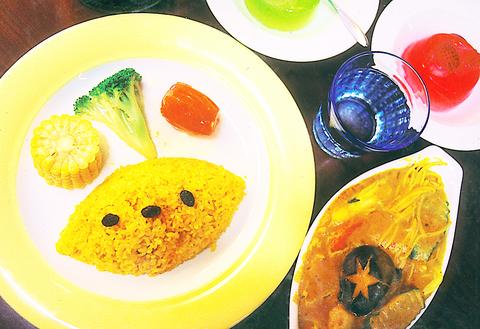Indian Fans is a decent little lunch shack, but in the end comes off as a restaurant that resulted from someone bringing their vacation home with them.
We all know someone who's gone on vacation and learned to cook Thai food in a Thai cooking school. And here on Yungkang Street, with its bright, tropical color scheme and decorative fabrics and carvings, is the Indian curry equivalent.
The restaurant's offerings are simple, curry set meals and a range of beverages. The owners claim that they grind and then boil the curry themselves, eschewing ready-made pastes and powders. But I say the proof is in the pudding.

PHOTO: DAVID FRAZIER, TAIPEI TIMES
I tried two types of curry, lamb (NT$200 set) -- in which the curry and the meat were fried in with the rice -- and vegetarian (NT$200 set) -- which came as a more standard curry presentation, with the curried vegetables coming in a companion dish to the plate of saffron rice and side vegetables. The lamb was good, but came off more as a tasty lamb fried rice as there was no spiciness and the curry flavor was faint. The vegetarian curry contained delicious vegetables, but the curry was a little too sweet with coconut milk.
The more I thought about it, the more the food seemed to be what could technically be called "fusion" -- cooking that results from the intersection of two cultures, but in the end belongs to neither of them. All of the vegetables in the veggie curry dish can also be tossed into a hot pot, but currying them and pouring them over a fairly authentic mound of saffron rice gives them a completely new identity. The stir-fried curry lamb (and beef) approach suggests a similar analogy, as does the curried fish cheeks set (NT$350).
But before I wander too far off into cultural anthropology, let me mention the beverages, which are probably Indian Fans' greatest strength. It sells strong Indian coffee for NT$60 and Masala milk tea for NT$70. When it gets warmer, it will sell lassi, the favorite Indian yogurt drink, both inside and from a to-go window facing Yungkang Park for a very reasonable NT$60. It should offer good competition to the glut of tea, coffee and bubble tea shops with which it shares a couple of neighborhood blocks.

In the March 9 edition of the Taipei Times a piece by Ninon Godefroy ran with the headine “The quiet, gentle rhythm of Taiwan.” It started with the line “Taiwan is a small, humble place. There is no Eiffel Tower, no pyramids — no singular attraction that draws the world’s attention.” I laughed out loud at that. This was out of no disrespect for the author or the piece, which made some interesting analogies and good points about how both Din Tai Fung’s and Taiwan Semiconductor Manufacturing Co’s (TSMC, 台積電) meticulous attention to detail and quality are not quite up to

April 21 to April 27 Hsieh Er’s (謝娥) political fortunes were rising fast after she got out of jail and joined the Chinese Nationalist Party (KMT) in December 1945. Not only did she hold key positions in various committees, she was elected the only woman on the Taipei City Council and headed to Nanjing in 1946 as the sole Taiwanese female representative to the National Constituent Assembly. With the support of first lady Soong May-ling (宋美齡), she started the Taipei Women’s Association and Taiwan Provincial Women’s Association, where she

Chinese Nationalist Party (KMT) Chairman Eric Chu (朱立倫) hatched a bold plan to charge forward and seize the initiative when he held a protest in front of the Taipei City Prosecutors’ Office. Though risky, because illegal, its success would help tackle at least six problems facing both himself and the KMT. What he did not see coming was Taipei Mayor Chiang Wan-an (將萬安) tripping him up out of the gate. In spite of Chu being the most consequential and successful KMT chairman since the early 2010s — arguably saving the party from financial ruin and restoring its electoral viability —

It is one of the more remarkable facts of Taiwan history that it was never occupied or claimed by any of the numerous kingdoms of southern China — Han or otherwise — that lay just across the water from it. None of their brilliant ministers ever discovered that Taiwan was a “core interest” of the state whose annexation was “inevitable.” As Paul Kua notes in an excellent monograph laying out how the Portuguese gave Taiwan the name “Formosa,” the first Europeans to express an interest in occupying Taiwan were the Spanish. Tonio Andrade in his seminal work, How Taiwan Became Chinese,